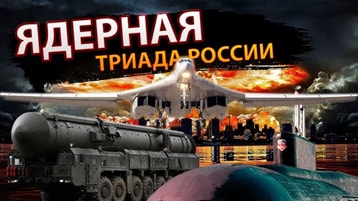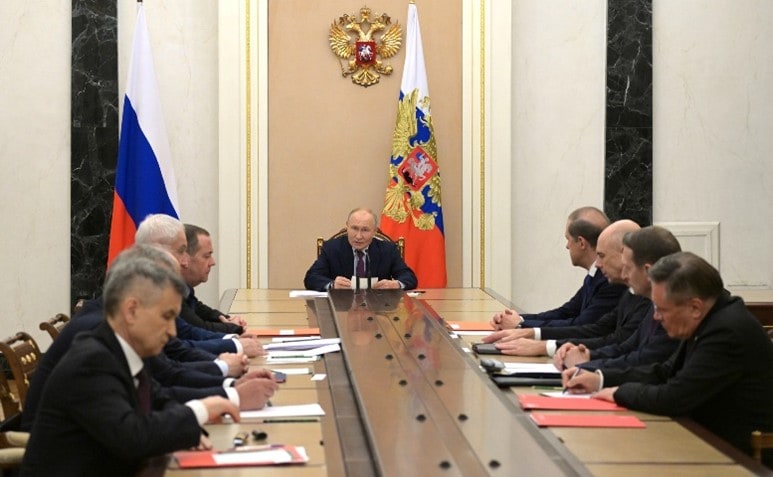Chinese academic Yang Zhen, the deputy director of the Center for Northeast Asian Studies at Shanghai University of Political Science and Law, discussed Russian President Vladimir Putin's September 25, 2024 update of the foundations of the country's nuclear deterrence policy.[1] The updated version of Russia's nuclear doctrine involves the following changes: "Russia expanded the scope of states and military alliances subject to nuclear deterrence measures. Aggression against Russia by any non-nuclear-weapon state, but with the participation or support of a nuclear-weapon state, is considered as a joint attack on Russia. Russia reserves the right to use nuclear weapons in the event of such aggression. Furthermore, if conventional weapons pose a serious threat to Russia's sovereignty, it will also be grounds for a nuclear response. Russia also reserves the right to use nuclear weapons in the event of aggression against Belarus as a member of the Union State." (See ANNEX)
According to Yang Zhen, the Russia-NATO confrontation on nuclear security is bound to have serious consequences in the security field. "As the large holders of nuclear arsenals, Russia and NATO are essentially in a spiral of confrontation. Given the high intensity of previous conflicts, there is now little room for compromise between the two sides," he stated.
Below is Yang Zhen's article:[2]

(Source: Youtube.com)
Russia's Nuclear Triad Remains The Most Important Security Guarantee For Russia
"Security has increasingly become a core issue in international politics since the Ukraine crisis and the issue of nuclear security has risen to a new height since the Cold War.
"Recently, Russian President Vladimir Putin chaired a permanent conference on nuclear deterrence, an annual event within the framework of the Security Council of Russia.[3] The meeting primarily focused on updating the foundations of the country's nuclear deterrence policy.
"According to Putin, Russia has always been highly responsible in matters like nuclear weapons, striving to prevent the spread of nuclear weapons and their components. Russia's nuclear triad remains the most important security guarantee for Russia and an instrument for maintaining balance of forces in the world. In the updated version of Russia's nuclear doctrine, Russia expanded the scope of states and military alliances subject to nuclear deterrence measures. Aggression against Russia by any non-nuclear-weapon state, but with the participation or support of a nuclear-weapon state, is considered as a joint attack on Russia. Russia reserves the right to use nuclear weapons in the event of such aggression. Furthermore, if conventional weapons pose a serious threat to Russia's sovereignty, it will also be grounds for a nuclear response. Russia also reserves the right to use nuclear weapons in the event of aggression against Belarus as a member of the Union State.
"Russia's actions are not isolated as NATO has also been active in the nuclear field. Recently, the Atlantic Council, a well-known think tank, called for NATO to adapt its nuclear sharing program, suggesting the deployment of B-61 nuclear bombs to Eastern Europe and the establishment of a network of intermediate-range missile bases across Europe. The think tank praised Washington's decision to send Tomahawk and SM-6 missiles to Germany as a 'good start,' and insisted that it 'does not impose a high enough price' on Russia.
"The U.S. had deployed hundreds of new nuclear bombs at several air bases in Germany, the Netherlands, Belgium, Italy, and Türkiye as of last year. There are also reports that the U.S. plans to redeploy nuclear weapons in the UK after a 15-year hiatus. Additionally, the topic of 'extended deterrence' was discussed for the first time during the '2+2' talks between the foreign and defense ministers of Japan and the U.S. this year. The U.S. pledged to use military force, including nuclear weapons, to protect its allies."
The Confrontation Between Russia And NATO On Nuclear Security Is Bound To Have Serious Consequences
"The confrontation between Russia and NATO on nuclear security is bound to have serious consequences in the security field.
"First, it will worsen the global security environment. As the large holders of nuclear arsenals, Russia and NATO are essentially in a spiral of confrontation. Given the high intensity of previous conflicts, there is now little room for compromise between the two sides.
"Second, it will change the nature of nuclear weapons. Currently, the world is in the intermediate to advanced stages of informationized warfare. Emerging technologies such as artificial intelligence (AI) and big data are being increasingly applied to military fields. In particular, AI has significantly altered the face of warfare. The confrontation between the U.S. and Russia in the nuclear field will likely lead to the application of emerging military technologies to nuclear weapons and fundamentally change its nature.
"Third, it will further deteriorate the international nuclear arms control system. In recent years, the arms control mechanisms established during the Cold War have been continuously undermined. After the U.S. withdrew from the Anti-Ballistic Missile Treaty and the Intermediate-Range Nuclear Forces Treaty, Russia announced in February 2023 that it would suspend its participation in the New Strategic Arms Reduction Treaty (New START) with the U.S., halting the sharing of nuclear weapon information. The U.S. subsequently announced it would stop exchanging nuclear data with Russia as well. With the U.S. and Russia holding over 90 percent of the world's nuclear weapons, their repeated breaches of agreements put the mutual supervision and transparency mechanisms in the nuclear arms control field at risk of collapse, which severely impacts the international arms control framework. The ongoing 'nuclear confrontation' between the two will further damage this system."
ANNEX: Meeting Of The Security Council Standing Conference On Nuclear Deterrence, September 25, 2024 (Kremlin.ru)
The meeting was attended by Deputy Chairman of the Security Council Dmitry Medvedev, First Deputy Prime Minister Denis Manturov, Defence Minister Andrei Belousov, Finance Minister Anton Siluanov, Director of the Federal Security Service Alexander Bortnikov, Director of the Foreign Intelligence Service Sergei Naryshkin, First Deputy Secretary of the Security Council Rashid Nurgaliyev, General Director of the Roscosmos State Corporation for Space Activities Yury Borisov, and Director General of State Atomic Energy Corporation Rosatom Alexei Likhachev.
Below are excerpts of Russian President Vladimir Putin's speech:[4]

(Source: Kremlin.ru)
'Russia's Transition To The Use Of Nuclear Weapons'
Putin: "Today we are holding a planned meeting, which is called Standing Conference on nuclear deterrence. We hold it twice a year. And today, we will discuss an issue related to updating the Basic Principles of State Policy on Nuclear Deterrence.
"Alongside the Military Doctrine, this is a document that officially defines and details Russia's nuclear strategy. First of all, it sets forth the basic principle of using nuclear weapons: the use of nuclear forces is the last resort measure to protect the country's sovereignty.
"Let me stress that we have always been highly responsible in matters like this, being well aware of the colossal power these weapons have, striving to strengthen the international legal foundation for global stability and prevent the spread of nuclear weapons and their components.
"At present, our nuclear triad remains the most important security guarantee for our state and citizens, an instrument for maintaining strategic parity and balance of forces in the world.
"At the same time, we can see that the modern military-political situation is rapidly changing and we have to factor that in, including the emergence of new sources of military threats and risks for Russia and our allies.
"It is important to predict the development of the situation and adjust the provisions of the strategic planning document in accordance with current realities.
"Over the last year specialists from the Defense Ministry, Foreign Ministry, Security Council Office and other agencies have made an in-depth and comprehensive analysis and evaluated the need for adjusting our approaches to a possible use of nuclear forces. Based on the results of this work, a number of updates have been proposed in terms of defining the conditions for using nuclear weapons.
"Thus, the draft Basic Principles expand the category of states and military alliances in respect of which nuclear deterrence is exercised and expand the list of military threats to be neutralized by nuclear deterrence measures.
"I would like to draw your attention specifically to the following. The updated version of the document is supposed to regard an aggression against Russia from any non-nuclear state but involving or supported by any nuclear state as their joint attack against the Russian Federation.
"It also states clearly the conditions for Russia's transition to the use of nuclear weapons. We will consider such a possibility once we receive reliable information about a massive launch of air and space attack weapons and their crossing our state border. I mean strategic and tactical aircraft, cruise missiles, UAVs, hypersonic and other aircraft.
"We reserve the right to use nuclear weapons in the event of aggression against Russia and Belarus as a member of the Union State. All these issues have been agreed upon with the Belarusian side and the President of Belarus. Including the case when the enemy, using conventional weapons, creates a critical threat to our sovereignty.
"In conclusion, I will note that all the updates have been deeply calibrated and are measured against contemporary military threats and risks to the Russian Federation."








